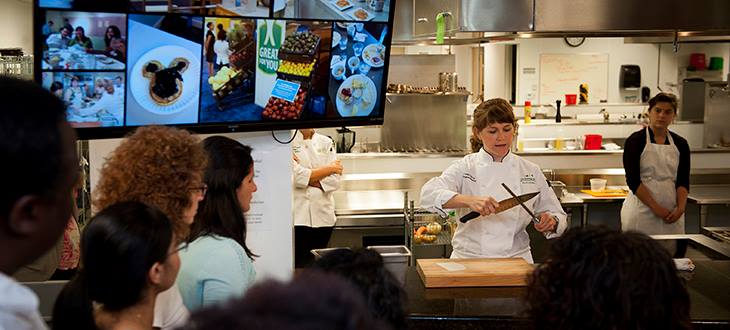Culinary medicine meets doctor’s office
On any given day in an industrial-sized kitchen on North Broad Street, Tulane University medical students are putting down their stethoscopes and lab coats, picking up forks and knives and learning the ins and outs of healthy cooking.
Tulane University School of Medicine is the first medical school in the nation to require courses in culinary medicine through the Goldring Center for Culinary Medicine. The idea for requiring culinary courses began seven years ago and has built momentum ever since. Leah Sarris, the center’s director of operations and executive chef, is the first chef in the country on a medical school faculty.
“Historically, medical students learn very little about nutrition,” Sarris said. “They may have a day or two about it, and when they do, it’s focused on biochemistry, the sciences, the nutrients … but not necessarily anything about how to intervene by telling people to change their diet.”
Sarris said she wants to change that, making food and nutrition part of the discussion in the doctor’s office by educating future physicians.
“If we use food as a form of preventative medicine, we can try and keep patients away from our clinics for those illnesses that are easily prevented if you are conscious of your choices in the kitchen,” first-year student Gabriel Miranda said. “That’s why I want to go into medicine. I want to make people live longer and be healthier …”
In 1985, the National Academy of Sciences published a report recommending that all medical school students receive 25 or more hours of nutrition training. In 2010, medical students were receiving an average of 19.6 hours of nutrition education, and in 2014, 75 percent of physicians reported feeling inadequately trained to counsel their patients on diet and nutrition.
Timothy Harlan, associate dean of clinical services and executive director of the Goldring Center, said he seeks to help change those statistics.
“For a long time, people have lamented the fact that there was no nutritional focus in medical school instruction when it is extremely powerful,” Harland said. “… No one had attempted to systemically look at what a medical school student and physician should know and how to have that conversation in the doctor’s office.”
Now, Tulane medical students must take at least three courses in culinary medicine but can opt to take more elective courses during their medical school experience.
“We’re now licensed by 28 medical schools in the US, which is about 17 percent,” Sarris said. “[We have] seven residency programs, two nursing schools, and we just licensed our first international school in the [United Kingdom]. So we’ve really made ourselves a world leader in this culinary medicine space. There’s no one doing this like we are …”
At the Goldring Center, medical students get hands-on experience that helps them prepare for a career in the medical field in ways they do not necessarily obtain from traditional classroom instruction.
“I feel like it’s a class that should be given at all med schools,” Miranda said. “It gives us a chance to learn firsthand what types of methods of cooking and eating habits … to recommend to our future patients that are looking for dietary changes and improvement in health.”
A key component of the mission is to bring culinary medicine and healthy living to the greater New Orleans community. Medical students can participate in community classes that are free and open to the public and that seek to help New Orleans community members learn nutritional cooking.
“We have a huge food culture here, and we’re very proud of our food, but it’s also very unhealthy food,” Sarris said. “As a result, people in Louisiana and New Orleans … have some of the highest incidences in the nation of diabetes, hypertension, heart disease, heart attacks … I feel like if we can do it here, we can do it anywhere.”
With multiple courses for medical students and health care providers and six to seven community cooking classes every week, the Goldring Center is making its mark on the next generation of physicians while also investing in the health and longevity of the local community.
“The magic here–and it is magic–is that if you come to one of our community classes, [you will see] the diversity and breadth of people who come, socioeconomically and culturally,” Harlan said. “There will be a CEO, an HR person, a secretary from Tulane, a UPS driver, an undergraduate student. These are people [who] would never ever cook and eat together, and that’s just magic. That’s New Orleans.”
Your donation will support the student journalists of Tulane University. Your contribution will allow us to purchase equipment and cover our annual website hosting costs.



